Russian HNWIs adapting to changing financial climate: results of a joint survey by Tranio & Adam Smith Conferences
For the first time, more than 50% of affluent Russian nationals have started reporting their foreign bank accounts and controlled foreign companies to the Russian tax authorities. This is the estimate given by the respondents of the third annual joint survey conducted by Tranio and Adam Smith Conferences in 2018. Surveyed respondents include private banking experts, lawyers and tax consultants that are working with High-net-worth individuals HNWIs.
• 58% of HNWIs have reported their foreign bank accounts to the Russian tax authorities.
According to the average estimates provided by the respondents, in 2017 approximately 42% of wealthy Russian nationals notified the tax authorities of their accounts abroad, as per the requirement of the federal law ‘On Foreign Exchange Regulation and Foreign Exchange Control’. In 2018, the share reached 58%.
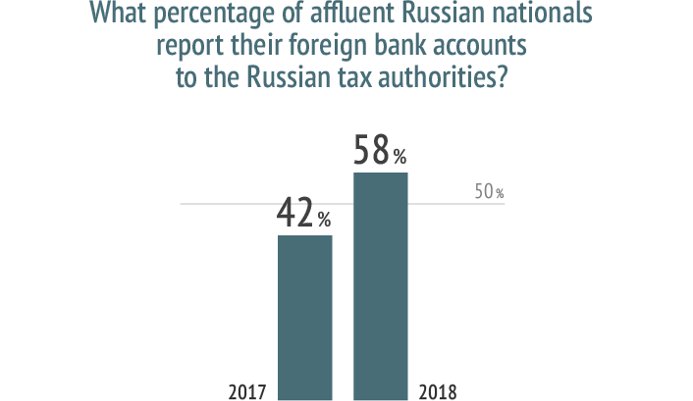
“The percentage of those reporting has primarily increased because Russia has begun exchanging tax information more robustly with other countries under CRS and CbC since 2018” explains George Kachmazov, Managing Partner of Tranio. “There have been many technical and organisational inconsistencies in the exchange process so far, and so the procedures will take several years to mature. But the ice has been broken: the initial exchange has been made, and the account holders see that from now on it will become more difficult to conceal assets from the state”.
For the first time, over 50% of affluent Russian nationals began to report on their foreign bank accounts and foreign companies under control to Russian tax authorities.
According to the survey results, the share of those reporting their foreign accounts is especially high among the Russian nationals with assets valued between $1m and $30m, reaching 65%. “Those with the wealth of less than $1m are of the least concern to the tax authorities", according to Mr. Kachmazov, “for which reason they can keep quiet for the moment in the hope that the tax authorities will not have enough resources to check everyone at once. And those with over $30m are more likely to change residency than disclose their accounts to the Russian tax authorities”. The second statement complies with the results of the 2017 survey: the wealthier the person, the more they seek to become a tax resident in another country.
“UHNWIs have the financial and technical ability to become residents of other countries”, Mr Kachmazov continues. “Apart from the ‘moderately rich’, who are usually unable to leave Russia for 6 months and longer since they have an operating business that requires looking after They have therefore resigned themselves to the inevitability that it is ultimately better to arrange and declare their accounts as required by law”.
• 57% of affluent Russian nationals declare their CFCs.
The situation with the owners of controlled foreign companies is similar: according to the survey results, around 57% have declared their CFCs (Controlled Foreign Corporations) as required by the Tax Code in 2018, while in the previous year, the figure was just 45%.
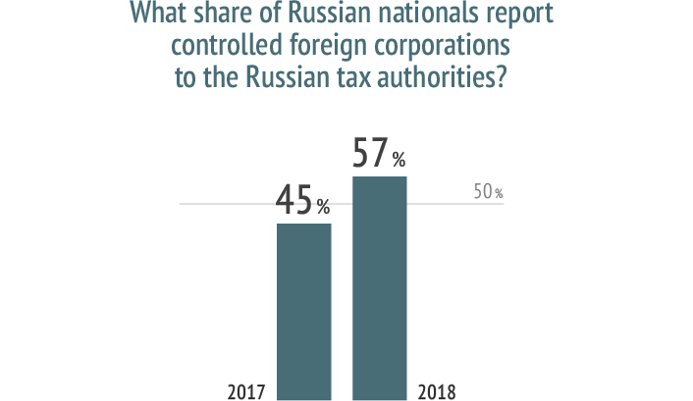
Some respondents observed that affluent Russian nationals mainly declared newly-opened bank accounts and companies while closing the previously-owned ones in order to stay off the tax authorities' radar. “This is a very common practice”, Mr Kachmazov confirms. “Clients en masse withdraw all the money from their previously-owned accounts, close those accounts and transfer their money to Russia. After that, they open a new foreign account, let's say, with a completely different bank, and legally transfer all the funds over there while submitting all the required declarations. The transaction history is reset to zero once this process is complete, and the tax authorities never get the chance to learn about the previously-owned assets”.
Well-off Russian nationals flock to close previously-owned foreign accounts and CFCs while opening the new ones (with a clean transaction history) they report to the tax authorities.
• The tax-exempt liquidation programme for foreign companies was popular
As found in the previous surveys, rich Russian nationals aim to change their tax residency under the new conditions. This option was way ahead of the rest, scoring 48% in 2016 and 78% in 2017. This is why the main focus in the 2018 survey was to evaluate the behaviour of HNWIs from Russia who remain Russian tax residents for one reason or another. According to the respondents, capital holders primarily follow two strategies in this case: participate in the tax-free liquidation of foreign companies (73% of the respondents) and filing declarations as part of the capital amnesty (71%).
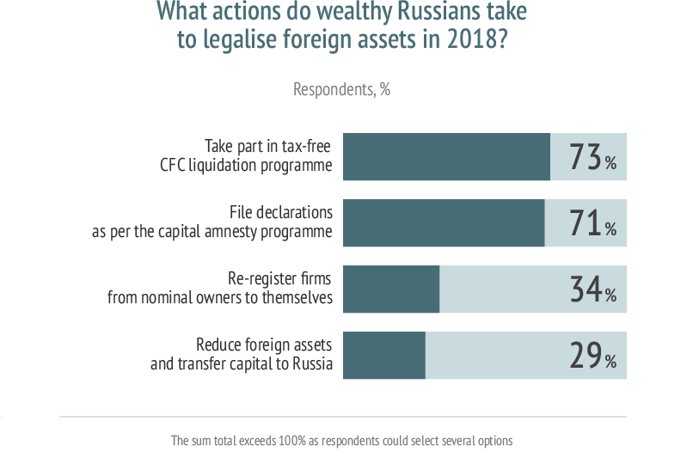
The richer the HNWIs are, the more likely they are to participate in the tax-exempt liquidation of foreign companies and structures, the benefits of which were extended in February 2018 to March 1, 2019. In the segment of HNWIs ($1-5mn in assets), this option was chosen by just 63% of respondents, while in the segment of UHNWIs (over $30mn) that number was 88%.
“Tax-free liquidation serves for asset restructuring as a temporary measure during the transition period”, According to Anton Ionov, Partner, CIS Personal Tax Leader at EY. “Individuals can close companies with being affected by taxes, this usually being just a single stage of a larger restructuring process. Correspondingly, the richer the individual is, the more complex is the asset holding structure, and so the asset restructuring via tax-free liquidation is more relevant”.
But conversely, more affluent Russian nationals are less prone to file declarations under the capital amnesty, according to the survey participants. “This is probably the case due to the fact that since March 1, 2018) the second wave of amnesty has begun”, Mr Kachmazov believes. “Most of the well-off clients have started ‘arranging’ their assets as required by law soon after the first stage (2015−2016), which is why another amnesty is irrelevant to them. When you are under the scrutiny of the tax authorities, you would be aiming to do everything by the book right away, rather than rectify the mistakes later”.
The wealthier the HNWIs are, the more likely they are to participate in the tax-free liquidation of foreign companies and structures.
Reducing foreign assets and transferring capital to Russia is the least popular strategy among Russian HNWIs, according to 33% of the respondents in 2017 and 29% in 2018. At the same time, the richer the person is, the less likely he is to act in this way. Mr Ionov believes that “the issue is about risk diversification: UHNWIs already have a lot of Russia-related risks to deal with, for which reason they are trying to reduce them via international investment”.
• Foreign bank account holders are active participants of the capital amnesty campaign
According to 68% of respondents, the major participants of the second stage of capital amnesty are foreign bank account holders who are wary of problems due to the automatic data exchange procedures (CRS, CbC) coming into force.
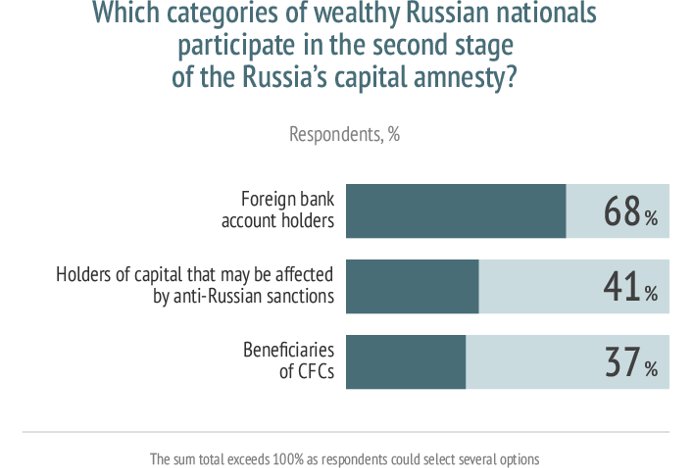
The other options include — “capital holders who may fall victim of anti-Russian sanctions” and “beneficiaries of controlled foreign companies” — scored a significantly smaller number of votes. “Clearly, there are more people that hold foreign bank accounts than the number of those who own companies abroad”, Mr Kachmazov explains. “Individuals under sanctions are transferring their assets to Russia”, Mr Ionov adds, "but the circle of these people is rather limited and does not affect the general trend”.
• Cyprus, Switzerland and the UK are the major destinations for the outflow of capital from Russia
Cyprus leads the pack among the countries where affluent Russian nationals move their funds. I was named by 52% of the respondents. This jurisdiction is historically popular with Russian-speaking HNWIs. “Business maintenance costs are low in Cyprus; the company tax rate is just 12.5%”, according to Mr Kachmazov. “In addition, Cyprus uses the English law strongly preferred by the corporate finance, as well as many Russian-speaking lawyers and consultants. Banks have always been favourably inclined towards Russian nationals, some of them are still owned by Russians”.
However, the confidence placed in Cyprus was shaken by the 2013 banking crisis which, among other consequences, led to the expropriation of deposits. According to Mr Kachmazov, “the situation keeps getting worse: Cyprus is under pressure from the US, and there are many press reports of ‘Russian’ money being persecuted in Cyprus”.
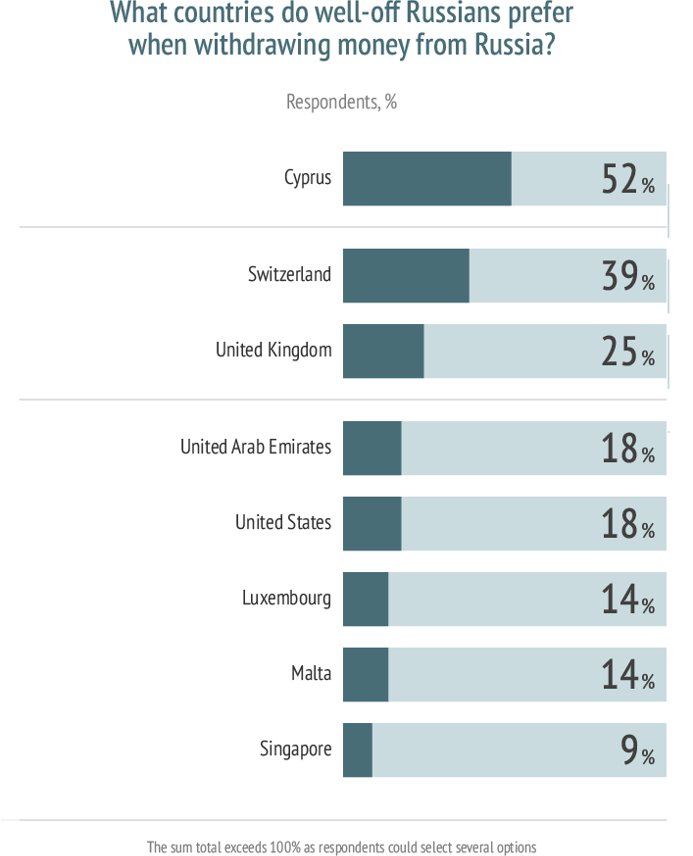
Switzerland and the UK rank second and third, respectively; these countries are especially popular among the most wealthiest private clients from Russia seeking to store capital. “The richest Russian immigrants live in London”, Mr Kachmazov emphasises, “So, there is no surprise that they keep their money there. It must be said, however, that the ultra-rich diversify capital: they have certain accounts in England, others in Switzerland and additional accounts in the US or somewhere else."
According to the survey results, the richer the HNWIs are, the more likely they are to transfer capital to the three countries at the top of the list as well as to the US and Luxembourg. Conversely, large capital owners less often prefer the UAE, Malta and Singapore.
Only a handful of respondents mentioned the BVI, the Cayman Islands and other jurisdictions previously popular as OFCs (offshore financial centre). “The utilisation of offshore companies is gradually coming to almost nothing all around the world”, Mr Kachmazov says. “As a result of the legislative changes which took place over the past decade, such companies find it difficult to open accounts with established banks; these accounts are difficult to pass money through, and such companies are practically difficult to conceal like before”.
The utilisation of offshore companies is gradually coming to almost nothing all around the world.
• Foreign bank checks create hurdles for wealthy Russian nationals
Foreign banks stiffening compliance procedures leads to significant difficulties for those depositing money from Russia. Notably, the problem of proving the lawful origins of the capital is one of the most common reasons for why real estate transactions to be aborted (as demonstrated by Tranio's recent analytical report).
Over half (57%) of the respondents described the situation as ‘not fatal but significant problems frustrate business plans’. Many also chose the option ‘minor difficulties that can be overcome routinely’.
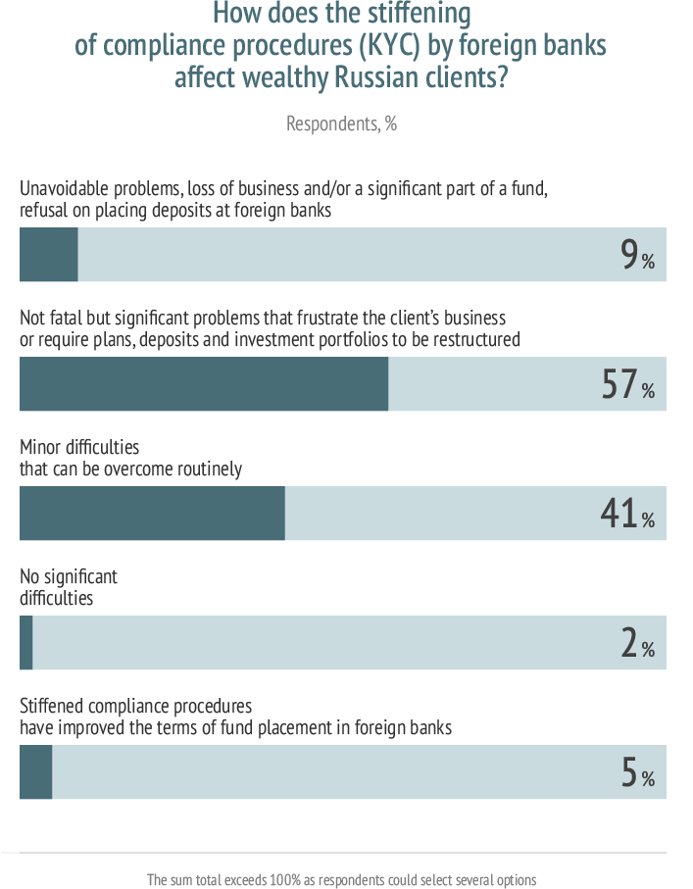
“Foreign banks have become unwilling to deal with Russian nationals”, Mr Kachmazov said. “Banks are now obliged to make sure that the money is clean, for which reason they tie up clients with endless red tape until all the formal regulations are adhered to. And even if everything is fine with the formalities, the bank may find fault within some small details and turn the client away just because of a biased attitude towards Russian money”.
Interestingly, as much as 5% of the respondents flagged a counterintuitive option: in their opinion, stiffened compliance procedures have improved the terms of fund placement in foreign banks.
• 15% of HNWIs participate in club deals
According to the survey results, about 15% of affluent Russian nationals invest in club deals (investment projects with 5-15 participants), and the wealthier the HNWIs are, the more willingly they participate in such projects.
“15% is a very positive sign for us”, Mr Kachmazov says. “The trend towards the ultra-rich is understandable: they have management companies that are used to acting as joint shareholders in various enterprises which makes club deals a comprehensible scenario for them. And for the less wealthy individuals, this still is a new story. But I am sure that more and more Russian nationals will invest in club deals as time goes by”.
We expect the number of Russian-speaking investors taking part in club deals to grow in the near future.
We will send you a content digest not more than once a week